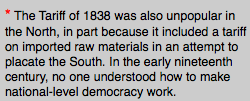Good news for the drunk ghost of John C. Calhoun: the state of Florida, previously known as the place that combines the hypersexual narcissism of California with the bugs of Nicaragua, is now also the new hot spot for nullification. You remember nullification, right? The 19th-century political theory that reserved for individual states the right to declare federal laws unconstitutional? Originally used to protest the so-called Tariff of Abominations of 1828 and 1832? Jesus, it’s like none of you is currently enrolled in sophomore history. It’s also like no one in the Florida state legislature is doing that, either, since the senate just proposed an amendment to the state constitution that would exempt Florida residents from the Affordable Health Care Act’s individual coverage mandate. Don’t worry; it passed. Props to Ben “Bang!” Gabriel for the link.
Doesn’t The New American have an engaging prose style? Half a sentence into this news story, I already know that the passage of the proposed amendment is “a significant milestone on behalf of those who oppose the federal Patient Protection and Affordable Health Care Act (a.k.a. ObamaCare) as unconstitutional, draconian, and an infringement on states’ rights.” Even if you’re not sick of insignificant milestones like I am, you have to admit that such snappy reporting is a real improvement on The Old American. The mention of states’ rights is telling, too. It reminds us that the underlying theory behind this amendment reached its zenith of popularity when the protection of the valiant individual from an overreaching federal government was an extremely important issue, both for the people who ran state governments and for the people who picked their cotton.
The year is 1833. The US government has just passed the Tariff of 1832—a.k.a. the Tariff of Abominations, as the New American would say—and South Carolina is pissed. The tariff has levied a duty on imported finished goods, much to the dismay of the South, which imports many such goods and regards the tariff as naked favoritism toward northern manufacturers.* Enter the theory of nullification, which held that because the federal government was a compact among the states, any individual state could declare any federal law unconstitutional. You know, the way that because your office is an agreement among everyone who works there, you can declare that Casual Fridays do not require pants.
Enter the theory of nullification, which held that because the federal government was a compact among the states, any individual state could declare any federal law unconstitutional. You know, the way that because your office is an agreement among everyone who works there, you can declare that Casual Fridays do not require pants.
The theory of nullification is questionable on several levels, as Andrew Jackson pointed out using the US Army, but “states’ rights” has survived as a foundational conservative principle. That it was also once the bane of the Republican Party is one of those historical ironies that you can bring up to quickly end a second date. But none of that matters now. The important thing is that in November of 2012, Florida voters can pass a goddamn permanent amendment to their state constitution addressing one particular federal law passed last year, while simultaneously reviving a historical fallacy they’ve probably never heard of.
If you think that Obamacare is surely too insignificant an issue to prompt a showdown between the US government and the state of Florida, consider that in 1833, the country briefly flirted with civil war over a tax on saucepans. Serious policy problems require compromise, but it’s the symbolic stuff that really gets you. That probably explains why the 20 or so percent of Florida residents who have no health insurance have not concerned state legislators up to this point, but the possibility that they might have to pay $50 apiece for not buying it has them tinkering with their foundational governing document. When you’re trying to prove something, anything that supports it is by definition reasonable.
As you might remember, Florida was sort of an important state in a recent presidential election. This particular ballot initiative may be a get-out-the-vote tactic from state Republicans, just as anti-gay marriage amendments were in 2000 and 2004. If it is, and the already sluggish field of 2012 GOP candidates is sweetened by the profoundly gestural insanity of a nullification amendment, it’s probably going to work. Nothing riles ’em up like a completely symbolic policy. To find something more symbolic than Obamacare, you apparently have to look back two centuries.





All this ballyhoo requires the question be asked: does Dan Brooks look more like Andrew Jackson or Henry Clay?
BG- Andy Jackson, absolutely. Though I doubt he’d stand up to a couple large-caliber pistol shots like Old Hickory did. http://www.badassoftheweek.com/jackson.html
correction: actually, this image of Clay makes me reconsider: http://www.americaslibrary.gov/assets/jb/reform/jb_reform_claydied_1_e.jpg
If nullification is about to become all the rage, perhaps the states that allow gay marriage should vote to nullify the federal Defense of Marriage Act.
Put that in your tea pipe and smoke it!